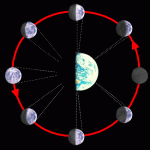orbits
"To disagree leads to study, to study leads to understanding, to understand is to appreciate, to appreciate is to love. So maybe I'll end up loving your theory." -John Wheeler
Out there in the Universe, there's a lot to marvel at. Over billions of years, gravity has attracted different portions of the expanding Universe together into large superclusters and filaments, each made up of clusters, groups, and individual galaxies separated by great cosmic voids.
Image credit: Sloan Digital Sky Survey, 2dF Galaxy Redshift Survey, and Millenium Simulation.
From the observations of this structure…
"Building one space station for everyone was and is insane: we should have built a dozen." -Larry Niven
Here on the solid ground of the Earth, the Sun and Moon rise and set on a daily basis. During the hours where the Sun is invisible, blocked by the solid Earth, the stars twirl overhead in the great canopy of the night sky.
Image credit: Chris Luckhardt at flickr.
In the northern hemisphere, they appear to rotate around the North Star, while in the southern hemisphere, the stars appear to rotate about the South Celestial Pole. The longer you observe -- or for photography, the longer you…
One of my favorite podcasts to listen to while driving or mowing the lawn is [Buzz Out Loud](http://bol.cnet.com). Buzz Out Loud (BOL) is basically just a tech-based podcast, but very entertaining. Anyway, as part of my attention seeking disorder, I try to get mentioned on the show. I succeeded once when I posted my [Optimal Commuting Speed Calculator](http://www.dotphys.net/page1/page10/efficiency/calculator.html). When I heard Tom and Rafe talking about orbital speeds, I realized this was my chance. Find any tiny flaw in their reasoning and I could perhaps come up with a comment worthy…
I recently saw a comment on a blog somewhere about putting satellites into space (I think it was from a post about a rocket that blew up). The poster suggested using a giant catapult to put things in space instead of rockets. Maybe he or she was kidding, or maybe not. But I have heard this idea before. Would it work?
First, how do things get in orbit? Orbit is a motion in which the gravitational force on an object makes it move in a circle around another object. In order to be in a circular orbit, it takes a certain amount of energy.
Let me just start with some calculations. How fast…
The Moon goes around the Earth, the Earth goes around the Sun, and the Sun goes around the center of the Milky Way. We know the Moon takes about 4 weeks to make its trip around the Earth, and that causes the Moon phases:
We also know that the Earth takes one year to go around the Sun, and that causes the seasons:
We also know that the Earth has been around for about 4.5 billion years, which means it has gone around the Sun about 4.5 billion times. Well, now I ask the question(s):
How long does it take the Sun to go around the Milky Way? How many times has it done that so far, and how many…


